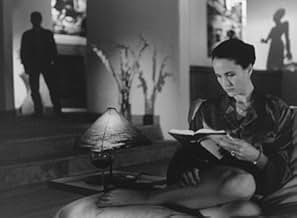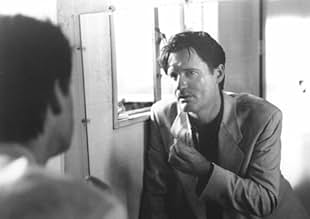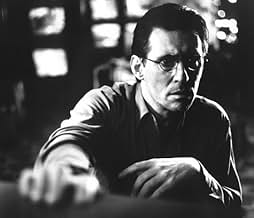VALUTAZIONE IMDb
5,6/10
5441
LA TUA VALUTAZIONE
Aggiungi una trama nella tua linguaMike is a successful Hollywood producer of violent movies. Then he himself experiences extreme violence, goes missing, joins some Latino gardeners and reviews his life.Mike is a successful Hollywood producer of violent movies. Then he himself experiences extreme violence, goes missing, joins some Latino gardeners and reviews his life.Mike is a successful Hollywood producer of violent movies. Then he himself experiences extreme violence, goes missing, joins some Latino gardeners and reviews his life.
- Premi
- 1 vittoria e 4 candidature totali
Nicole Ari Parker
- Ade Kenya
- (as Nicole Parker)
Samuel Fuller
- Louis Bering
- (as Sam Fuller)
Recensioni in evidenza
How 'bout a four? Visually, there are some great moments. I think the most interesting scenes are those where there is no dialogue but the camera follows the characters as they inwardly contemplate what this all means (Bill Pullman, Andie McDowell). Unfortunately, we as the viewers are also given (too much) time to contemplate what it means. Everything is WAY too understated. The movie slows to a stop in many places. You start to like it (the romance with Kat and the investigator, the interaction of Bill Pullman's character and the Mexican-American people) and then it doesn't follow through. The dialogue at the film school, in which the characters give a monologue for a class is probably the most interesting dialogue. Some rap, some tell a story, some recite their own poetry. That was the most moving part of the movie. While Wenders has a important point to make, it doesn't come through clearly and the viewer is left uncaring, uninterested. Maybe the only thing that could have helped the End of Violence is more good ole fashioned...violence <g>.
I watched this movie a few times, and I have met very few people who liked it as much as I did. I see it as an artful expression of all the critical thoughts in philosophy, sociology etc. that show how genocide, ultra-violence and fascist methods of population-control can develop out of all the promises of order, justice and peace the the modern state makes to its citizens. Also, the dialogue has absolutely superb moments, as when Mike the fugitive of the state says to his wife confronts his ex-wife with the words "Who can I turn myself into? Well I see who you turned yourself into...". A lot of people seem to dislike the loose ends and unexplained shifts that the characters make - but I say, in that very absence of rigid structure the film makes a parallel to the manifest ambivalence of modern life as a citizen: Our greatest protector is also our greatest threat.
You don't turn to Wim Wenders when you're looking for nerve-tightening suspense. Though written (by Nicholas Klein, with Wenders) in paranoid-thriller form, the script lacks even a nubbin of McGuffin to anchor the narrative. Two stories run in parallel: Bill Pullman's an action-film producer gone missing after an attempt on his life; Gabriel Byrne's a NASA computer jock on loan to a mysterious satellite surveillance project. Just as yuppie cop Loren Dean is on the point of tying the two tales together, the movie's over, the plot unresolved.
Oh, well: Los Angeles (mainly Malibu, Santa Monica, and Griffith Park) looks great (cinematography Peter Przgoda), and Wenders has an uncanny ability to get actors to feel comfortable in their skins. The most notable skin in question is Traci Lind's: her role as a stunt-woman turned aspiring actress would have made her a star in a more mainstream movie.
If you're a Wenders fan, don't let the commercial failure of this film put you off: Compared to, say, 'Far Away, So Close' it's as electrifying as 'The 39 Steps.' And somehow, as usual, Wenders's almost childlike intensity of gaze makes you look harder, too. The aroma of the film lingers, even as its substance slides through your fingers like sand.
Oh, well: Los Angeles (mainly Malibu, Santa Monica, and Griffith Park) looks great (cinematography Peter Przgoda), and Wenders has an uncanny ability to get actors to feel comfortable in their skins. The most notable skin in question is Traci Lind's: her role as a stunt-woman turned aspiring actress would have made her a star in a more mainstream movie.
If you're a Wenders fan, don't let the commercial failure of this film put you off: Compared to, say, 'Far Away, So Close' it's as electrifying as 'The 39 Steps.' And somehow, as usual, Wenders's almost childlike intensity of gaze makes you look harder, too. The aroma of the film lingers, even as its substance slides through your fingers like sand.
...or as I like to think of it, THE END OF VIOLENCE is the greatest scifi crime thriller that never was.
As always with Wim Wenders, the plot is fantastic. But, as always with Wim Wenders, the movie isn't about the plot, and those who expect to be carried by the plot will be disappointed. In the same way WINGS OF DESIRE had a great plot about angels but was not a fantasy; in the same way UNTIL THE END OF THE WORLD had a great plot about a high tech dream machine but was not about technology; in the same way LISBON STORY had a riveting plot about a missing person but was not a mystery, here we have the same Wendersian formula which he pulls off flawlessly.
The plot, if you're curious, is about a futuristic "God machine" that can eliminate people with the push of a button. Designed ostensibly for crime prevention & surveillance (the old "to protect & serve" - where have we heard that before?), it gets out of control and takes murder & corruption to the next level of clinical perfection. Caught up in the game is Mike Max, a movie producer struggling with his own intense xenophobia and paranoia, which, like a disease, he himself spreads to society through his films.
That's all I'll say about the plot because (a) I don't want to ruin anything, and (b) like I said, the plot is secondary. What's really important, as you watch this movie, is to pay attention to the thought-provoking dialogue, the philosophical allusions and the overall metaphor of the situation. If you can tune into that stuff, then you're set for a great experience.
I'll give you just one example of the philosophy. There's a scene early on where they talk about the "observer effect" (you might recognize it as the paradox of "Schrödinger's cat" which you can look up on wikipedia). This is the fundamental theme of the film: the idea that, even by "impartially observing", we change the situation or in some cases destroy it. As one of the characters says, it's like "flipping on the light to observe the darkness." What a poetic & appropriate analogy.
This movie is choc full of that kind of stuff, and you may miss it if you're expecting car chases and gunfire. No, instead you get the ultimate anti-violence violence film, and I gotta give Wenders a standing ovation on being the first director I've seen pull it off.
A lot of movies in the past have carried a message of anti-violence; yet the films sink to the thrill of showing violence themselves and often glorifying it (the biggest example would be Norm Jewison's classic ROLLERBALL), and this becomes confusing if not outright hypocritical. But in this case, we get a chilling depiction of the epidemic of violence without showing any blood & guts to excite our savage instincts. It remains an intellectual film, not visceral. Don't get me wrong; this movie is plenty suspenseful, and on more than one occasion it'll have your heart flopping like an electrified noodle. But it's all done by way of the mind. To me, that's what makes this depiction of violence all the more effective & frightening: the way it's so clean & neat like in a video game. And without any fuss, someone's head could just go pop.
This is the best film I've seen in a while. I'm only taking off a few points because I wished it was twice as long & had more monologues, like some of the older Wenders films. But I have to say this film sticks to its objective and delivers a perfect product.
As always with Wim Wenders, the plot is fantastic. But, as always with Wim Wenders, the movie isn't about the plot, and those who expect to be carried by the plot will be disappointed. In the same way WINGS OF DESIRE had a great plot about angels but was not a fantasy; in the same way UNTIL THE END OF THE WORLD had a great plot about a high tech dream machine but was not about technology; in the same way LISBON STORY had a riveting plot about a missing person but was not a mystery, here we have the same Wendersian formula which he pulls off flawlessly.
The plot, if you're curious, is about a futuristic "God machine" that can eliminate people with the push of a button. Designed ostensibly for crime prevention & surveillance (the old "to protect & serve" - where have we heard that before?), it gets out of control and takes murder & corruption to the next level of clinical perfection. Caught up in the game is Mike Max, a movie producer struggling with his own intense xenophobia and paranoia, which, like a disease, he himself spreads to society through his films.
That's all I'll say about the plot because (a) I don't want to ruin anything, and (b) like I said, the plot is secondary. What's really important, as you watch this movie, is to pay attention to the thought-provoking dialogue, the philosophical allusions and the overall metaphor of the situation. If you can tune into that stuff, then you're set for a great experience.
I'll give you just one example of the philosophy. There's a scene early on where they talk about the "observer effect" (you might recognize it as the paradox of "Schrödinger's cat" which you can look up on wikipedia). This is the fundamental theme of the film: the idea that, even by "impartially observing", we change the situation or in some cases destroy it. As one of the characters says, it's like "flipping on the light to observe the darkness." What a poetic & appropriate analogy.
This movie is choc full of that kind of stuff, and you may miss it if you're expecting car chases and gunfire. No, instead you get the ultimate anti-violence violence film, and I gotta give Wenders a standing ovation on being the first director I've seen pull it off.
A lot of movies in the past have carried a message of anti-violence; yet the films sink to the thrill of showing violence themselves and often glorifying it (the biggest example would be Norm Jewison's classic ROLLERBALL), and this becomes confusing if not outright hypocritical. But in this case, we get a chilling depiction of the epidemic of violence without showing any blood & guts to excite our savage instincts. It remains an intellectual film, not visceral. Don't get me wrong; this movie is plenty suspenseful, and on more than one occasion it'll have your heart flopping like an electrified noodle. But it's all done by way of the mind. To me, that's what makes this depiction of violence all the more effective & frightening: the way it's so clean & neat like in a video game. And without any fuss, someone's head could just go pop.
This is the best film I've seen in a while. I'm only taking off a few points because I wished it was twice as long & had more monologues, like some of the older Wenders films. But I have to say this film sticks to its objective and delivers a perfect product.
Wim Wender's The End of Violence is a rather disjointed and uninvolving piece of film-making. It wants to be a tale about how violence affects our lives and how, once exposed to it, we find ourselves fundamentally changed. It might actually succeed if it wasn't busy confusing the audience and boring them to death at the same time.
As the film opens, we are treated to a day in the life of Hollywood producer Mike Max (Bill Pullman), who is busy wheeling and dealing through multiple phones and computer connections, all the while ignoring his wife, Paige (Andie McDowell). While he is out during the day, he is kidnapped by two not quite bright hit men who are killed in a mysterious fashion and Mike Max manages to escape. He is found dazed by some Latino gardeners and Mike decides that he needs to hide from his old life to protect himself while discovering that violence, which he has peddled in action movies, is a bad thing. Meanwhile, Paige has taken over her husbands company in his absence and developed a relationship with a recording artist named Six (K. Todd Freeman) who provides the love she was lacking in her relationship with Mike. Also meanwhile, technical whiz Ray Bering (Gabriel Byrne) is busy putting the finishing touches on a high-tech surveillance system that the government hopes to use to bring violence in the city under control. However, Ray begins to suspect that the system is possibly being used for nefarious purposes and is trying to get someone to listen to him. And yet elsewhere still, stuntwoman turned actress Cat (Traci Lind) is getting her big acting break in Mike's latest film, and she finds herself somewhat smitten with detective Dean Brock (Loren Dean) who is investigating the disappearance of Mike.
As you can probably tell from the above paragraph, The End of Violence has a lot going on. The problem is that little of it is compelling and because the film is busy juggling so many plot threads at the same time, several of them seem like afterthoughts. The subplot featuring Paige's involvement with Six, for instance, has absolutely no emotional resonance for the audience because we barely know these people. The film also takes a lot of side trips to inexplicable scenes where people gather at performance art sessions to get some bigger message across, I guess, but they just end up being pointless and drawing the film out even more.
Wenders manages to suck the life out of most of the scenes in the film. The acting is uniformly wooden and unconvincing, the characters are little more than bodies going through the motions, and the plot is half-explained and developed. Take the plot thread of Ray trying to discover the truth about the surveillance system. It is revealed eventually that he has actually already been in contact with Mike about it with the hopes of revealing the system to the public, but the film has so many pieces moving around that it takes forever to make the connection between those two characters.
The film also features dreaded voice-over monologues that are just silly and pretentious. The anti-violence message, what there is of it, is also heavy-handed, to say the least. In one scene, Six speaks to Mike on the phone and gives us a long explanation about why violence is good and people revel in it. You can practically see Wenders on his soapbox while this scene is going on.
I suppose this movie is supposed to be a thriller to some degree, but there is little that is thrilling about The End of Violence. It is a monotonous bore of a film that comes to a rather abrupt ending without really dealing with all of the issues it seems to want to explore. Instead of an end of violence, I'll take an end to this particular mess.
As the film opens, we are treated to a day in the life of Hollywood producer Mike Max (Bill Pullman), who is busy wheeling and dealing through multiple phones and computer connections, all the while ignoring his wife, Paige (Andie McDowell). While he is out during the day, he is kidnapped by two not quite bright hit men who are killed in a mysterious fashion and Mike Max manages to escape. He is found dazed by some Latino gardeners and Mike decides that he needs to hide from his old life to protect himself while discovering that violence, which he has peddled in action movies, is a bad thing. Meanwhile, Paige has taken over her husbands company in his absence and developed a relationship with a recording artist named Six (K. Todd Freeman) who provides the love she was lacking in her relationship with Mike. Also meanwhile, technical whiz Ray Bering (Gabriel Byrne) is busy putting the finishing touches on a high-tech surveillance system that the government hopes to use to bring violence in the city under control. However, Ray begins to suspect that the system is possibly being used for nefarious purposes and is trying to get someone to listen to him. And yet elsewhere still, stuntwoman turned actress Cat (Traci Lind) is getting her big acting break in Mike's latest film, and she finds herself somewhat smitten with detective Dean Brock (Loren Dean) who is investigating the disappearance of Mike.
As you can probably tell from the above paragraph, The End of Violence has a lot going on. The problem is that little of it is compelling and because the film is busy juggling so many plot threads at the same time, several of them seem like afterthoughts. The subplot featuring Paige's involvement with Six, for instance, has absolutely no emotional resonance for the audience because we barely know these people. The film also takes a lot of side trips to inexplicable scenes where people gather at performance art sessions to get some bigger message across, I guess, but they just end up being pointless and drawing the film out even more.
Wenders manages to suck the life out of most of the scenes in the film. The acting is uniformly wooden and unconvincing, the characters are little more than bodies going through the motions, and the plot is half-explained and developed. Take the plot thread of Ray trying to discover the truth about the surveillance system. It is revealed eventually that he has actually already been in contact with Mike about it with the hopes of revealing the system to the public, but the film has so many pieces moving around that it takes forever to make the connection between those two characters.
The film also features dreaded voice-over monologues that are just silly and pretentious. The anti-violence message, what there is of it, is also heavy-handed, to say the least. In one scene, Six speaks to Mike on the phone and gives us a long explanation about why violence is good and people revel in it. You can practically see Wenders on his soapbox while this scene is going on.
I suppose this movie is supposed to be a thriller to some degree, but there is little that is thrilling about The End of Violence. It is a monotonous bore of a film that comes to a rather abrupt ending without really dealing with all of the issues it seems to want to explore. Instead of an end of violence, I'll take an end to this particular mess.
Lo sapevi?
- QuizThere is a scene in the film where we see a live recreation of the painting "Nighthawks" by Edward Hopper.
- BlooperWhen Page is holding Mike at gunpoint she holds the gun upward with the bottom of the handle facing outward and the ammo clip is clearly missing. Yet when Mike exits through the patio door she fires the gun and shatters the glass.
Obviously there was a bullet in the chamber.
- Colonne sonoreBailare (El Merecumbe)
Written, Performed and Produced by Raul Malo
Courtesy of MCA Records, by arrangement with Universal Music
Special Markets
I più visti
Accedi per valutare e creare un elenco di titoli salvati per ottenere consigli personalizzati
- How long is The End of Violence?Powered by Alexa
Dettagli
- Data di uscita
- Paesi di origine
- Lingue
- Celebre anche come
- The End of Violence
- Luoghi delle riprese
- Griffith Observatory, 2800 E Observatory Rd, Los Angeles, California, Stati Uniti(Multiple interior and exterior scenes; as Ray Bering's workshop. Hillside hike viewpoint just south of observarory)
- Aziende produttrici
- Vedi altri crediti dell’azienda su IMDbPro
Botteghino
- Budget
- 5.000.000 USD (previsto)
- Lordo Stati Uniti e Canada
- 386.673 USD
- Lordo in tutto il mondo
- 386.673 USD
- Tempo di esecuzione2 ore 2 minuti
- Colore
- Mix di suoni
- Proporzioni
- 2.35 : 1
Contribuisci a questa pagina
Suggerisci una modifica o aggiungi i contenuti mancanti






































